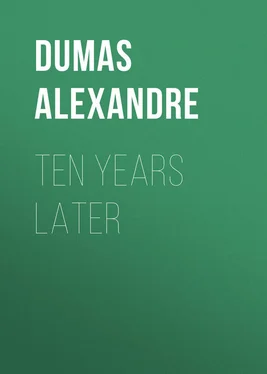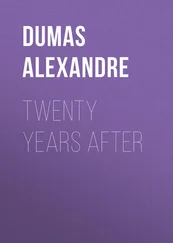Alexandre Dumas - Ten Years Later
Здесь есть возможность читать онлайн «Alexandre Dumas - Ten Years Later» — ознакомительный отрывок электронной книги совершенно бесплатно, а после прочтения отрывка купить полную версию. В некоторых случаях можно слушать аудио, скачать через торрент в формате fb2 и присутствует краткое содержание. Жанр: literature_19, foreign_antique, foreign_prose, на английском языке. Описание произведения, (предисловие) а так же отзывы посетителей доступны на портале библиотеки ЛибКат.
- Название:Ten Years Later
- Автор:
- Жанр:
- Год:неизвестен
- ISBN:нет данных
- Рейтинг книги:4 / 5. Голосов: 1
-
Избранное:Добавить в избранное
- Отзывы:
-
Ваша оценка:
- 80
- 1
- 2
- 3
- 4
- 5
Ten Years Later: краткое содержание, описание и аннотация
Предлагаем к чтению аннотацию, описание, краткое содержание или предисловие (зависит от того, что написал сам автор книги «Ten Years Later»). Если вы не нашли необходимую информацию о книге — напишите в комментариях, мы постараемся отыскать её.
Ten Years Later — читать онлайн ознакомительный отрывок
Ниже представлен текст книги, разбитый по страницам. Система сохранения места последней прочитанной страницы, позволяет с удобством читать онлайн бесплатно книгу «Ten Years Later», без необходимости каждый раз заново искать на чём Вы остановились. Поставьте закладку, и сможете в любой момент перейти на страницу, на которой закончили чтение.
Интервал:
Закладка:
“The only difference is, that I lend without interest,” said Malicorne, smiling.
“I was correct in saying you were either a saint or very much resembled one. M. Malicorne, you shall have the post you want, or I will forfeit my name.”
“Ah! monsieur le comte, what a debt of gratitude shall I not owe you?” said Malicorne, transported.
“Let us go to the prince, my dear M. Malicorne.” And De Guiche proceeded toward the door, desiring Malicorne to follow him. At the very moment they were about to cross the threshold, a young man appeared on the other side. He was from twenty-four to twenty-five years of age, of pale complexion, bright eyes and brown hair and eyebrows. “Good-day,” said he, suddenly, almost pushing De Guiche back into the courtyard again.
“Is that you, De Wardes? – What! and booted, spurred and whip in hand, too?”
“The most befitting costume for a man about to set off for Le Havre. There will be no one left in Paris to-morrow.” And hereupon he saluted Malicorne with great ceremony, whose handsome dress gave him the appearance of a prince.
“M. Malicorne,” said De Guiche to his friend. De Wardes bowed.
“M. de Wardes,” said Guiche to Malicorne, who bowed in return. “By the by, De Wardes,” continued De Guiche, “you who are so well acquainted with these matters, can you tell us, probably, what appointments are still vacant at the court; or rather in the prince’s household?”
“In the prince’s household,” said De Wardes looking up with an air of consideration, “let me see – the appointment of the master of the horse is vacant, I believe.”
“Oh,” said Malicorne, “there is no question of such a post as that, monsieur; my ambition is not nearly so exalted.”
De Wardes had a more penetrating observation than De Guiche, and fathomed Malicorne immediately. “The fact is,” he said, looking at him from head to foot, “a man must be either a duke or a peer to fill that post.”
“All I solicit,” said Malicorne, “is a very humble appointment; I am of little importance, and I do not rank myself above my position.”
“M. Malicorne, whom you see here,” said De Guiche to De Wardes, “is a very excellent fellow, whose only misfortune is that of not being of gentle birth. As far as I am concerned, you know, I attach little value to those who have but gentle birth to boast of.”
“Assuredly,” said De Wardes; “but will you allow me to remark, my dear count, that, without rank of some sort, one can hardly hope to belong to his royal highness’s household?”
“You are right,” said the count, “court etiquette is absolute. The devil! – we never so much as gave it a thought.”
“Alas! a sad misfortune for me, monsieur le comte,” said Malicorne, changing color.
“Yet not without remedy, I hope,” returned De Guiche.
“The remedy is found easily enough,” exclaimed De Wardes; “you can be created a gentleman. His Eminence, the Cardinal Mazarin, did nothing else from morning till night.”
“Hush, hush, De Wardes,” said the count; “no jests of that kind; it ill becomes us to turn such matters into ridicule. Letters of nobility, it is true, are purchasable; but that is a sufficient misfortune without the nobles themselves laughing at it.”
“Upon my word, De Guiche, you’re quite a Puritan, as the English say.”
At this moment the Vicomte de Bragelonne was announced by one of the servants in the courtyard, in precisely the same manner as he would have done in a room.
“Come here, my dear Raoul. What! you, too, booted and spurred? You are setting off, then?”
Bragelonne approached the group of young men, and saluted them with that quiet and serious manner peculiar to him. His salutation was principally addressed to De Wardes, with whom he was unacquainted, and whose features, on his perceiving Raoul, had assumed a strange sternness of expression. “I have come, De Guiche,” he said, “to ask your companionship. We set off for Le Havre, I presume.”
“This is admirable – delightful. We shall have a most enjoyable journey. M. Malicorne, M. Bragelonne – ah! M. de Wardes, let me present you.” The young men saluted each other in a restrained manner. Their very natures seemed, from the beginning, disposed to take exception to each other. De Wardes was pliant, subtle, full of dissimulation; Raoul was calm, grave, and upright. “Decide between us – between De Wardes and myself, Raoul.”
“Upon what subject?”
“Upon the subject of noble birth.”
“Who can be better informed on that subject than a De Gramont?”
“No compliments; it is your opinion I ask.”
“At least, inform me of the subject under discussion.”
“De Wardes asserts that the distribution of titles is abused; I, on the contrary, maintain that a title is useless to the man on whom it is bestowed.”
“And you are correct,” said Bragelonne, quietly.
“But, monsieur le vicomte,” interrupted De Wardes, with a kind of obstinacy, “I affirm that it is I who am correct.”
“What was your opinion, monsieur?”
“I was saying that everything is done in France at the present moment, to humiliate men of family.”
“And by whom?”
“By the king himself. He surrounds himself with people who cannot show four quarterings.”
“Nonsense,” said De Guiche, “where could you possibly have seen that, De Wardes?”
“One example will suffice,” he returned, directing his look fully upon Raoul.
“State it then.”
“Do you know who has just been nominated captain-general of the musketeers? – an appointment more valuable than a peerage; for it gives precedence over all the marechals of France.”
Raoul’s color mounted in his face; for he saw the object De Wardes had in view. “No; who has been appointed? In any case it must have been very recently, for the appointment was vacant eight days ago; a proof of which is, that the king refused Monsieur, who solicited the post for one of his proteges .”
“Well, the king refused it to Monsieur’s protege , in order to bestow it upon the Chevalier d’Artagnan, a younger brother of some Gascon family, who has been trailing his sword in the ante-chambers during the last thirty years.”
“Forgive me if I interrupt you,” said Raoul, darting a glance full of severity at De Wardes; “but you give me the impression of being unacquainted with the gentleman of whom you are speaking.”
“I not acquainted with M. d’Artagnan? Can you tell me, monsieur, who does not know him?”
“Those who do know him, monsieur,” replied Raoul, with still greater calmness and sternness of manner, “are in the habit of saying, that if he is not as good a gentleman as the king – which is not his fault – he is the equal of all the kings of the earth in courage and loyalty. Such is my opinion, monsieur; and I thank heaven I have known M. d’Artagnan from my birth.”
De Wardes was about to reply, when De Guiche interrupted him.
Chapter VII. The Portrait of Madame
The discussion was becoming full of bitterness. De Guiche perfectly understood the whole matter, for there was in Bragelonne’s face a look instinctively hostile, while in that of De Wardes there was something like a determination to offend. Without inquiring into the different feelings which actuated his two friends, De Guiche resolved to ward off the blow which he felt was on the point of being dealt by one of them, and perhaps by both. “Gentlemen,” he said, “we must take our leave of each other, I must pay a visit to Monsieur. You, De Wardes, will accompany me to the Louvre, and you, Raoul, will remain here master of the house; and as all that is done here is under your advice, you will bestow the last glance upon my preparations for departure.”
Читать дальшеИнтервал:
Закладка:
Похожие книги на «Ten Years Later»
Представляем Вашему вниманию похожие книги на «Ten Years Later» списком для выбора. Мы отобрали схожую по названию и смыслу литературу в надежде предоставить читателям больше вариантов отыскать новые, интересные, ещё непрочитанные произведения.
Обсуждение, отзывы о книге «Ten Years Later» и просто собственные мнения читателей. Оставьте ваши комментарии, напишите, что Вы думаете о произведении, его смысле или главных героях. Укажите что конкретно понравилось, а что нет, и почему Вы так считаете.












